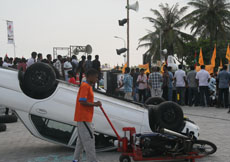Industry concerns that last week’s protests and Hong Kong’s subsequent travel alert would affect the growing Chinese tourism market in the Maldives have eased.
Sources at the Arabian Travel Market held in Dubai last week expressed concern at a number of cancellations from tour operators in the Asian region following the issue of the alert, which placed the Maldives alongside Israel, Iran, Indonesia, Russia and Pakistan.
A major Shanghai-based tour operator said today that despite 10 cancellations last week during the widely publicised protests, the situation had improved and bookings were improving this week.
However Minivan News understands that one major international airline operating to the Maldives suffered a 20 percent cancellation on booked and reserved tickets from several countries in the region last week, and expressed concern that communication with operators regarding future business had also suffered.
Locally, Manager of Traders Hotel Ester Marcaida said the hotel had received no cancellations as a result of the protests, “although it is possible it may have affected future bookings. So far so good.”
Traders is a bellweather as it accommodates many charter passengers from China transiting to seaplane after arriving from the Asian region – most international airlines arrive in the evening and passengers must overnight in Male.
“It’s a sizeable business for us,” Marcaida said, adding that “charters from Singapore and Malaysia haven’t been affected.”
The Maldives Ambassador to China, Ahmed Latheef, said he had been assured by Chinese tourism authorities that it did not intend to issue a travel alert for the Maldives, unless advised to do so by the country’s Ministry of Foreign Affairs.
“It is true there was some effect from media coverage of the protests in Male’,” he said, “but it was not as bad as it could have been. The travel alert was only for Hong Kong – there was no alert for mainland China.”
There had been some concern expressed by travel agencies sending tourists to the Maldives, he noted, although the numbers were down as it was not high season for Chinese travellers.
“One tour operator called to say he’d seen a travel alert in Hong Kong and wanted to find out the situation,” Latheef said. “We did what we could and sent out a circular explaining that the tourist resorts were far from Male’ where the protests were occurring.”
Rise of the dragon
China is a major emerging market for the Maldives and is now the country’s leading tourism market in terms of arrivals, eclipsing the UK last year and offsetting a slump in the European market due to the economic recession.
The Maldives received 120,000 Chinese visitors in 2010, an increase of 96 percent on 2009.
Most tourists from the region stay relatively briefly – four nights is the average stay – and spend an average of US$2500: a gross input to the economy of US$300 million.
“If you look at the numbers they speak for themselves,” Latheef told Minivan News. “The Chinese market will be very important – there is so much interest in the Maldives.”
Latheef explained that the Chinese market was attracted to the Maldives not only because of the beach and the sun – a major drawcard for those trapped in the European winter.
“It also carries a lot of prestige in China to say you have been to the Maldives,” he said. “It carries status. A lot of people have increasing spending power, and have been to many European countries. The Maldives is much sought-after and very popular.”
Resorts had been slow to react and cater to the market, but had noticeably increased efforts to hire Mandarin-speaking staff, he noted.
“The Chinese have specific requirements of which we have to be mindful,” he said. “They prefer Chinese food, and they feel safer if there are staff who speak Mandarin as many only speak their own language. There are a lot of things that need attention.”


